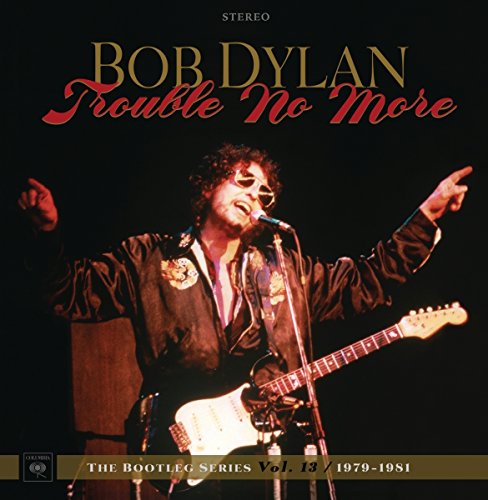
Bob Dylan
Trouble No More: The Bootleg Series, Vol. 13 1979-1981
Release Date: Nov 3, 2017
Genre(s): Singer/Songwriter, Pop/Rock, Contemporary Pop/Rock, Album Rock, Rock & Roll
Record label: Columbia
Music Critic Score
How the Music Critic Score works
Buy Trouble No More: The Bootleg Series, Vol. 13 1979-1981 from Amazon
Album Review: Trouble No More: The Bootleg Series, Vol. 13 1979-1981 by Bob Dylan
Excellent, Based on 5 Critics
Based on rating 8.5/10
Even so, the gradual realization that Dylan had not so much found as dived headfirst into Christianity and would from now on devote his concerts (explored in exhaustive detail on Trouble No More, the 13th instalment in the ongoing Bootleg Series which delves into the extensive archive of unreleased Dylan recordings) entirely to the new 'Gospel' material caused the kind of furore that made the booing that greeted Dylan's 'going electric' in 1965 seem like a minor upset Considered from a remote of 40-odd years, the stern tone of some of the criticism that greeted the concerts that followed the release of 1979's Slow Train Coming - a considerable commercial success - seems a bit excessive. Nick Cave , Sufjan Stevens , even The Killers : we're pretty used to artists and bands holding unhidden religious beliefs which may occasionally bubble into surface in their work. In any case, Dylan's most cherished work was created in the 60's, a time when every on-trend rock star signed up to some sort of a personal guru or spiritual leader, notions that Dylan back then steadfastly resisted, and his songs had occasionally dipped into religious imagery from 1964's "When The Ship Comes In" onwards.
Based on rating 8.1/10
In the autumn of 1978, Bob Dylan began performing a new version of "Tangled Up in Blue. " In addition to a complete melodic makeover, he updated a lyric that had previously referenced an unnamed Italian poet to address a more specific source text: "She opened up the Bible and started quoting it to me/Jeremiah, Chapter 13, verses 21 and 33. " Debuted during the tour behind his directionless Street Legal LP, his new arrangement of the beloved track offered a glimpse at Dylan's next reinvention: You can hear a white light starting to seep in.
Based on rating 4/5
The arguments of this edition of the Bootleg Series are familiar -- a disparaged period in Dylan's career (in this case, the gospel years) was better than you think; the studio recordings don't tell the story as well as the live shows; he was so busy chasing the moment that he left some of the best stuff in the vault. And, yes. The first two CDs, lovingly assembled from live tracks spanning 24 months and 19 cities, showcase a band that could bend toward tradition without losing any of the brute force that defined rock in one of its last moments at culture's center stage.
Based on rating 8/10
Bob Dylan converted to Christianity in 1979. Like many who have been born again, Dylan spoke and sang solely of his faith for a brief period -- roughly half a year, beginning in November of 1979 and ending in May of 1980. Facing a fan base who were generally furious at his newfound religion, Dylan started to thread some oldies into his set lists but he didn't leave gospel behind until he released Infidels in 1983.
Opinion: Excellent
On one hand, it's no great mystery that when Bob Dylan seemed to find new faith around 1979, a lot of fans and Dylanologists lost theirs -- in him. On the other, Dylan's track record for musical revelation was so firmly established by that time that he could have put out an album of songs about his stamp collection and they would have been worthy at least of honest consideration. But Dylan's apparent conversion to what sounded a lot like fundamentalist Christianity struck many as a stark turnaround from tenets we had come to expect from him, and from rock music itself -- first and foremost being a healthy skepticism toward institutional conventions of any kind.
'Trouble No More: The Bootleg Series, Vol. 13 1979-1981'
is available now

